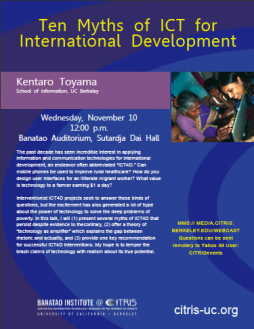ICT4D – the application of information and communication technologies for international development – is moving to a new phase. This will require new technologies, new approaches to innovation and implementation, new intellectual perspectives and, above all, a new view of the world's poor. All these must be understood if we are to harness digital technologies in the service of some of our world's most pressing problems.
This paper explains the phase change – from "ICT4D 1.0" to "ICT4D 2.0" – and its implications. The background to these phases is reviewed, charting the logic and chronology of applying ICTs in developing countries. The implications of the phase change are then analysed.
First, in terms of new technology and application priorities. Then, in relation to new models of innovation we may need to embrace: from laboratory to collaborative to grassroots innovation. Next, in relation to new implementation models for funding, managing, and applying digital technology. Finally, the paper looks at necessary new worldviews to guide our thinking and our policies in this field; integrating perspectives from computer science, information systems and development studies. Additional commentaries and models provide a further set of rich insights into the future of ICT4D.
